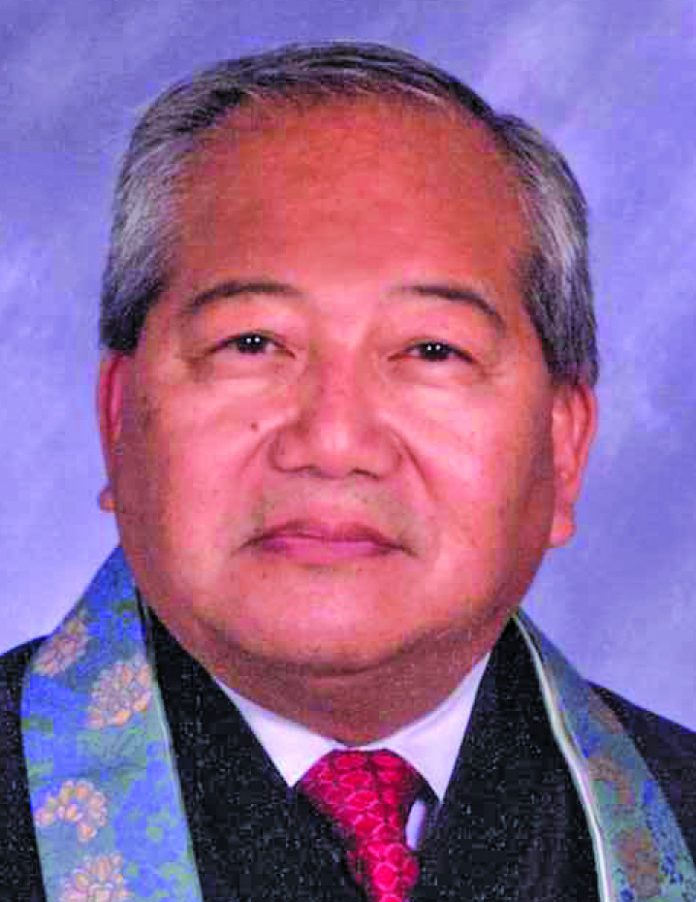MEMO FROM REV. SHINSEKI
In many areas around the state we are beginning to see a loosening of restrictions. Since March many of us have been “hunkered” down in our homes and going out very little. Between the Covid-19 pandemic and the wildfires many have been staying home and only going out for necessities. Now that the wildfires are under control and shelter-in-place loosening, we can go outside and enjoy the fresh air blue skies.
Whenever we experience events such as Covid-19, wildfires, rainstorms and poor weather, we may experience what has been called “cabin fever” the condition that creates agitation and irritability. This condition is usually reserved for the areas of the country where there are harsh winters, but now all of us have had the experience of being confined indoors. Cabin fever is a slang term for a claustrophobic reaction that takes place when we are isolated or shut in alone or together for an extended period. Historians say that the term “cabin fever” may have come about when there was an outbreak of disease and people who had fever were confined to their homes or cabins.
Until Covid-19 the term was reserved for our desire to see the sun, feel its warmth and get outside and exercise, walk or work in the yard. Now, this feeling of being confined is a real and shared experience for all of us.
Anxiety and irritability may ensue as we wait out the epidemic and a vaccine. At some point there will be a vaccine, but will there be a cure for the anxiety and irritability? The Buddha provided the Dharma, the teachings of the Buddha.
If we come down with the Covid-19 we would consult with our doctors. Prior to our consultation with the doctor, we would come to the self-realization that we indeed do have a fever. In some cases, we will verify with our spouses or significant others. Once we meet with our doctor he or she would diagnose the problem and suggest or prescribe to us medication or a procedure that will hopefully cure us. If we follow the advice and direction of our doctor in most cases, we will be cured.
The Buddha had been likened to a doctor who through the Dharma has prescribed a way to alleviate anxiety, irritability or whatever fever causes our uncomfortable state of being. The most difficult part of this process is the acknowledgment that we have a fever. Realizing that we are being grumpy, anxious, uncooperative, mean or irritable is not an easy thing to do. It is very easy to blame our spouse, coworker, friends, family, or children for our condition. “I am irritable because my kids never do what I ask them to do.” “I am grumpy because my husband snores and I can’t get a good night’s rest.”
This is the time when we should listen to our children, our spouses, friends and family. Through their actions and words, they can be telling us “You’re being a grouch,” “You’re being uncooperative,” “You’re being irritable.” Like the fever, sometimes we need those who are close to us to make us realize that we are afflicted this way. The Buddha then offers to us the cure and unlike the doctor, it is not in the form of a pill but is simply self-reflection. The Buddha called this correct view the first of the eightfold path.
Correct View means to see the interdependent nature of all things and to see the impermanent nature of those things. If we see ourselves as connected with our family and friends and the impermanent nature of those connections the result of this corrective view should result in us being less grouchy, less irritable and more appreciative of those connections. Correct View also means to be aware that the source of our irritability and grouchiness is not others but ourselves. We create our suffering through our expectations of what we want others to do for us. Ridding ourselves of this “fever” is not an easy thing to do, in fact we seem to get rid of it for a moment and then it returns.
It seems a never-ending cycle of realization and a return to the grouchiness. At either point, the true and real self is revealed to us. Namoamidabutsu is the expression of gratitude to the Buddha for showing us the way to see our fever and the way to rid ourselves of the fever and accepting us even when we are riddled with fever. Namoamidabutsu is the expression of gratitude to our parents, our friends, and our family who accept us as we are and reveal to us the fever that rages inside and manifests itself as grouchiness, anger, impatience and irritability. By being made aware we now can work on seeing the source of our fever and begin to apply the medicine of the Dharma to cure us, at least until the next fever begins to fume.
Like the sun that cures cabin fever, the Buddha’s teaching is like the warm sun that gives us a fresh perspective and cures the fevers that hamper us from living a full and fulfilling life.
Rev. Hosei Shinseki leads the Watsonville Buddhist Temple. His opinions are his own and do not necessarily represent those of The Pajaronian.











